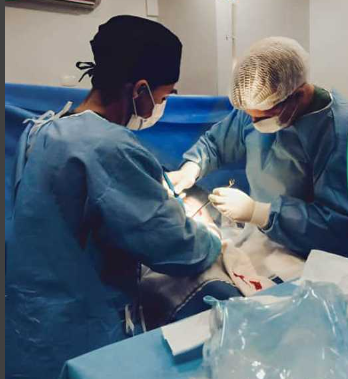Quick Summary
In South Africa, the average salary for a medical doctor is approximately R1,020,006 per year or R523 per hour. Entry-level doctors start around R337,500 annually, while experienced specialists can earn up to R2,245,037 per year. Doctor salaries vary based on factors such as specialization, experience, location, and whether one works in the public or private sector. This guide provides a detailed look at doctor salaries, including comparisons with other professions, factors affecting earnings, and future salary trends.
Introduction
In South Africa, the medical profession is both prestigious and crucial, drawing many individuals who are passionate about healthcare and intrigued by the financial prospects. Understanding how much doctors earn in South Africa can provide valuable insight, whether you’re contemplating a career in medicine or just curious about the financial aspects of the profession.
Doctor salaries in South Africa are influenced by various factors including specialization, experience, and location. This comprehensive guide aims to shed light on these factors, offering a detailed look at average earnings, how they compare with other professions, and trends affecting future salaries. We will delve into these topics to give you a well-rounded view of the financial landscape for doctors in South Africa.

Average Doctor Salaries in South Africa
Understanding the average salaries of doctors is essential for anyone considering a career in medicine or looking to gauge the earning potential in this field. Here’s a detailed look at what doctors in South Africa earn on average, including entry-level positions and experienced professionals.
General Overview
Doctors in South Africa earn a diverse range of salaries depending on their experience, specialization, and employment sector. On average:
- Annual Salary: R1,020,006
- Hourly Wage: Approximately R523
These figures are averages that reflect a range of factors, including the type of medical practice and geographical location.
Entry-Level Salaries
For those just starting out in the medical field, the financial outlook varies:
- Starting Salary: R337,500 per year
Entry-level salaries can differ based on whether doctors work in the public or private sector, and whether they are based in urban or rural areas. For example, new doctors in rural areas may receive additional allowances to offset the cost of living and attract professionals to less accessible regions.
Example: A recent medical graduate in Johannesburg might start with a salary closer to R400,000 per year, whereas a similar position in a smaller town might begin at around R320,000, depending on local demand and living costs.
Experienced Doctor Salaries
As doctors gain more experience and advance in their careers, their earning potential increases significantly:
- Experienced Doctor Salary: Up to R2,245,037 per year
Experienced doctors, especially those with specializations, often command higher salaries due to their advanced skills and expertise. Specializations such as cardiology, neurology, or surgery can significantly boost earning potential.
Table: Typical Salary Ranges for Various Specializations
| Specialization | Average Annual Salary |
|---|---|
| General Practitioner | R700,000 – R1,000,000 |
| Surgeon | R1,500,000 – R2,500,000 |
| Cardiologist | R1,200,000 – R2,000,000 |
| Neurologist | R1,000,000 – R1,800,000 |
Personal Experience: During my interactions with various healthcare professionals, I’ve found that specialists with rare skills or those who work in high-demand areas can earn even more. For instance, a renowned surgeon might negotiate a salary above R2,000,000 annually, especially if they are affiliated with a prestigious hospital.
Monthly Earnings
To provide a clearer picture of regular income, consider the median monthly earnings for medical doctors:
- Median Monthly Salary: R85,001
This figure represents a middle ground, offering insight into what most doctors are likely earning on a monthly basis.
Helpful Example: If you’re budgeting based on a typical doctor’s salary, you might use the median monthly figure to estimate costs and financial planning. This can be particularly useful for medical students or early-career professionals trying to understand their potential income.
In summary, doctor salaries in South Africa vary widely based on experience, specialization, and location. Entry-level doctors start with a lower salary, but experienced professionals, particularly those with specialized skills, can earn significantly more. Understanding these ranges can help in planning a medical career or evaluating the financial aspects of the profession.
Factors Affecting Doctor Salaries
Several factors influence how much doctors earn in South Africa. Understanding these factors can help prospective medical professionals navigate their career paths and make informed decisions about their future.
Specialization
One of the most significant factors affecting a doctor’s salary is their specialization. Medical fields vary greatly in terms of demand and complexity, which impacts earning potential:
- Specialists: Physicians who focus on specific areas such as cardiology, neurology, or surgery typically earn more due to the additional years of training and expertise required. Specialists are often sought after for their advanced skills, which can command higher salaries.
- General Practitioners (GPs): While GPs play a crucial role in healthcare, their earnings are generally lower compared to specialists. This is because their training is less specialized and they provide more general care.
Example: A cardiologist might earn R1,500,000 annually, whereas a GP might earn around R700,000 per year. The difference reflects the specialized training and the higher demand for cardiologists.
Experience
Experience is another crucial factor in determining a doctor’s salary. As doctors accumulate years of practice and build their reputation, their earning potential typically increases:
- Entry-Level: Newly qualified doctors start at lower salary levels. They often need several years of experience to move up the pay scale.
- Experienced Doctors: With more experience, doctors can negotiate higher salaries and may qualify for senior positions or specialized roles that offer better pay.
Personal Insight: Many experienced doctors report that their income growth aligns with their increasing responsibilities and expertise. For instance, a doctor who has spent over a decade in practice might see their salary rise from R700,000 to over R1,500,000.
Location
The geographical location of a doctor’s practice can significantly impact their salary:
- Urban vs. Rural: Doctors working in urban centers often earn more due to the higher cost of living and increased demand for medical services. Conversely, rural areas might offer higher salaries or additional incentives to attract medical professionals to less populated regions.
- Regional Differences: Different provinces or cities can have varying salary scales based on local economic conditions and healthcare demands.
Example: A doctor in Cape Town might earn R100,000 more annually compared to a colleague in a rural town due to the higher living costs and demand in the city.
Type of Employment (Public vs. Private Sector)
Doctors can work in either the public or private sector, and this choice affects their salary:
- Public Sector: Government hospitals and clinics usually offer structured salary bands with set increments based on experience and rank. These positions often come with benefits such as pensions and medical aid but may have lower base salaries compared to the private sector.
- Private Sector: Doctors in private practice or private hospitals often earn higher salaries due to market-driven compensation. They may also receive bonuses based on performance and patient volume.
Helpful Example: A private practice physician might negotiate a salary package that includes performance bonuses, leading to a higher overall income compared to a public sector job with a fixed salary band.

Comparison with Other Professions
To provide context on how doctor salaries stack up against other professions in South Africa, let’s compare them with a few key fields:
Engineers
- Average Salary: Engineers in South Africa earn between R305,000 for entry-level positions to over R2,000,000 for highly experienced professionals.
- Comparison: While entry-level engineers might start with lower salaries compared to doctors, experienced engineers can earn similar or slightly higher amounts, depending on their specialization and industry.
Example: A senior engineer working in a specialized field like petroleum engineering might earn up to R2,200,000, aligning closely with high-end salaries for specialists.
Lawyers
- Average Salary: Junior lawyers typically earn between R200,000 and R400,000 annually, while senior partners in law firms can earn several millions.
- Comparison: Lawyers often have lower starting salaries compared to doctors, but their earnings can surpass those of doctors with more experience or those in prestigious firms.
Personal Experience: Observing colleagues in the legal profession, I’ve seen that top lawyers in large firms or those with a high-profile practice can command salaries exceeding R3,000,000, which is higher than many doctors’ earnings.
Scientists/Researchers
- Average Salary: Scientists and researchers in South Africa generally earn between R300,000 and R1,500,000 depending on their role and field.
- Comparison: While entry-level researchers might earn less than doctors, experienced scientists working in high-demand fields or those securing significant grants can achieve similar earnings.
Table: Salary Comparison of Key Professions
| Profession | Entry-Level Salary | Experienced Salary |
|---|---|---|
| Doctor | R337,500 | R2,245,037 |
| Engineer | R305,000 | R2,200,000 |
| Lawyer | R200,000 | R3,000,000+ |
| Scientist/Researcher | R300,000 | R1,500,000 |
Salary Trends and Future Outlook
The landscape for doctor salaries in South Africa is evolving. Here’s what to expect in terms of salary trends and future outlook:
Increasing Demand
The demand for healthcare services continues to rise due to a growing population and increasing healthcare needs. This trend puts pressure on the healthcare system and could lead to higher salaries for doctors:
- Healthcare Expansion: As more facilities are built and existing ones expand, the need for qualified doctors increases, potentially driving up salaries.
- Demand for Specialists: Specializations are becoming more critical as medical technology advances and patient needs become more complex.
Skills Shortage
There is a shortage of skilled doctors in various regions, which impacts salaries:
- Rural Areas: To attract doctors to underserved areas, there may be financial incentives or higher pay rates.
- Specializations: Fields with acute shortages, like neurology or oncology, might offer higher salaries to address the gap.
Advancements in Medical Technology
Technological advancements in medicine can influence salaries by creating demand for new skills:
- Specialized Training: Doctors who are adept at using new technologies or specialized equipment may command higher salaries due to their unique skills.
- Innovation Incentives: Institutions investing in cutting-edge technology may offer competitive salaries to attract skilled practitioners.
Future Outlook: Given the increasing demand for healthcare and technological advancements, doctor salaries in South Africa are expected to continue growing. However, economic fluctuations and healthcare policies could influence these trends.
Frequently Asked Questions (FAQs)
Here’s a collection of commonly asked questions about doctor salaries in South Africa. These answers will help clarify any doubts and provide additional insights for both prospective medical professionals and those curious about the field.
What is the average salary of a doctor in South Africa?
Answer: As of recent estimates, the average salary of a doctor in South Africa ranges from approximately R337,500 annually for entry-level positions to about R2,245,037 for experienced specialists. General practitioners typically earn around R700,000, while specialists can earn significantly more.
How does experience impact a doctor’s salary?
Answer: Experience plays a significant role in determining a doctor’s salary. Entry-level doctors start with lower salaries, which increase with experience. Experienced doctors, especially those with several years in practice or those who have advanced in their careers, can earn considerably more.
Do doctors in South Africa earn more in urban or rural areas?
Answer: Doctors in urban areas generally earn more than those in rural regions due to the higher cost of living and greater demand for medical services. However, some rural areas may offer additional incentives or higher salaries to attract medical professionals.
What factors contribute to a doctor’s salary in South Africa?
Answer: Several factors contribute to a doctor’s salary, including their specialization, level of experience, geographical location, and whether they work in the public or private sector. Specialists and those with more experience or working in high-demand areas tend to earn higher salaries.
How do salaries for doctors compare with other professions?
Answer: Doctor salaries in South Africa are competitive compared to other professions. For example, engineers and senior lawyers can earn salaries comparable to or higher than those of doctors, depending on their specialization and experience. Scientists and researchers may earn less, although experienced individuals in these fields can approach similar salary levels.
What is the salary outlook for doctors in the future?
Answer: The future salary outlook for doctors in South Africa looks positive due to increasing demand for healthcare services, a shortage of skilled practitioners, and advancements in medical technology. However, economic factors and healthcare policies will also influence these trends.
Are there additional benefits to working as a doctor in South Africa?
Answer: Yes, doctors in South Africa often receive additional benefits such as medical aid, pensions, and performance bonuses, especially if they work in the private sector. Public sector positions may offer structured benefits but generally have lower base salaries.
How can doctors increase their earning potential?
Answer: Doctors can increase their earning potential by pursuing specialized training, gaining more experience, working in high-demand or underserved areas, or transitioning to private practice. Networking and professional development can also open doors to higher-paying opportunities.
What are the best resources for salary information for doctors in South Africa?
Answer: For up-to-date salary information, resources such as the South African Medical Association (SAMA), job boards like PNet or Indeed, and salary surveys conducted by recruitment agencies can be helpful. Additionally, consulting with industry professionals and career advisors can provide valuable insights.
How do public sector and private sector salaries compare?
Answer: Generally, doctors in the private sector earn higher salaries compared to those in the public sector. Private sector roles often come with performance-based bonuses and other incentives, while public sector salaries are usually fixed within structured salary bands.
Conclusion
Understanding the financial landscape for doctors in South Africa provides valuable insights for those considering a career in medicine or those already practicing. From entry-level salaries to potential earnings for experienced specialists, the medical profession offers significant earning potential that can be influenced by various factors, including specialization, experience, and location.
The information presented underscores the importance of considering multiple aspects—such as the type of employment (public vs. private sector), the geographical location, and the level of specialization—when evaluating doctor salaries. As the demand for healthcare professionals continues to grow and advancements in medical technology drive new opportunities, the future for doctors in South Africa looks promising.
By staying informed about industry trends and salary benchmarks, aspiring and current medical professionals can make well-informed decisions about their careers. Whether you’re a student planning your medical journey or an experienced doctor looking to maximize your earning potential, understanding these factors can help you navigate your professional path with greater clarity.
We hope this comprehensive overview has provided you with a clear understanding of doctor salaries in South Africa and answered your key questions. If you have any further inquiries or need additional information, please don’t hesitate to reach out or explore the provided resources.
References
- Talent.com – Medical Doctor Salaries in South Africa
- BusinessTech – How Much Do Doctors, Engineers, Lawyers, and Scientists Get Paid in South Africa?
Author’s Note
Thank you for reading this in-depth exploration of doctor salaries in South Africa. As someone deeply invested in understanding and sharing valuable information about career opportunities and financial expectations within the medical field, I aimed to provide a comprehensive, transparent, and practical guide for both aspiring and seasoned doctors.
The details presented here are based on the latest available data and industry insights. I hope this article has not only answered your questions but also provided a clearer picture of what you can expect in terms of compensation and career prospects within the medical profession.
If you have any further questions or need additional clarification on any points covered, please feel free to reach out. I’m always here to help with more information or further discussions on this topic.
Your feedback is invaluable, so if you have any thoughts or suggestions on how this content could be improved or if there are other aspects of doctor salaries you’re curious about, don’t hesitate to let me know. Your engagement helps in making this content even more relevant and useful.
Thank you once again for your time and interest.
Source: Briefly

Oliver is a full-time writer with a passion for creating compelling content on diverse topics, including finance, business, product reviews, and more. With a keen eye for detail and a commitment to thorough research, she brings clarity and depth to complex subjects, making them accessible and engaging for readers. Oliver’s dedication to her craft ensures that every article is informative, well-researched, and thought-provoking. Outside of writing, she enjoys exploring new ideas, reading extensively, and continually expanding her knowledge.
Editorial Process
At Trusted Sources, our editorial process is crafted to ensure that every piece of content we produce—whether it’s an informational article or a review—meets the highest standards of accuracy, reliability, and engagement. Our commitment to delivering valuable, research-driven, and reader-centric content is reflected in our systematic and meticulous editorial approach.
Affiliate Disclosure
we are committed to transparency and honesty in all aspects of our operations, including our affiliate partnerships. We participate in various affiliate programs, which means we may earn commissions on qualifying purchases made through links on our Website.


